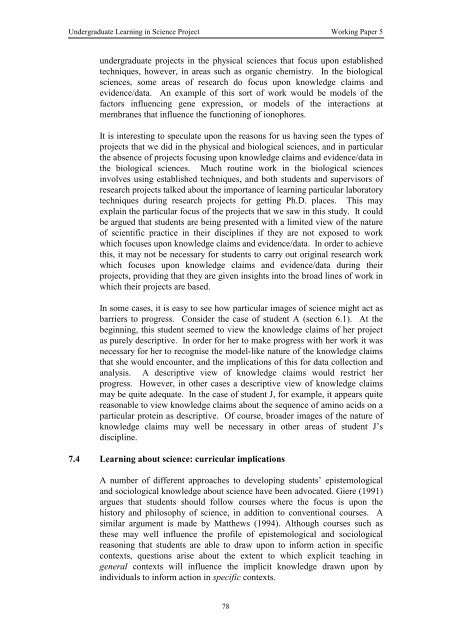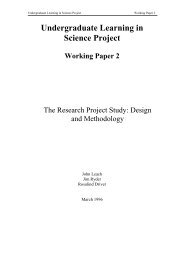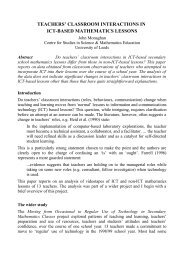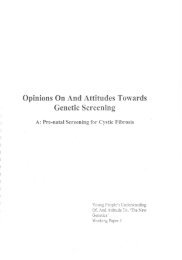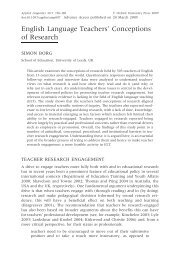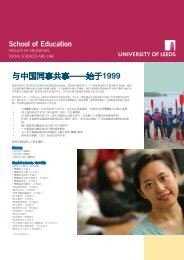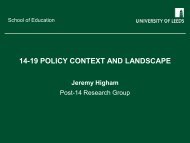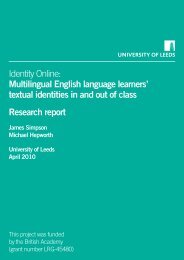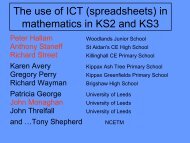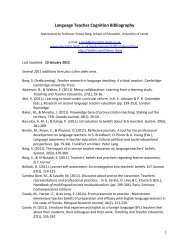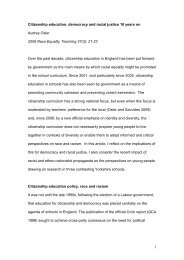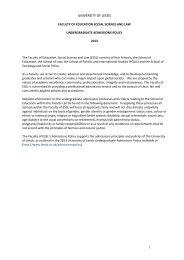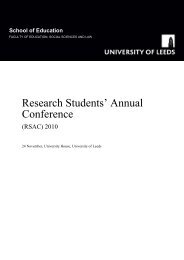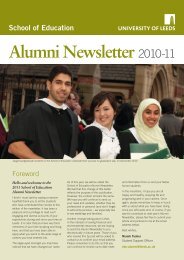Undergraduate science research projects and students - School of ...
Undergraduate science research projects and students - School of ...
Undergraduate science research projects and students - School of ...
Create successful ePaper yourself
Turn your PDF publications into a flip-book with our unique Google optimized e-Paper software.
<strong>Undergraduate</strong> Learning in Science Project Working Paper 5undergraduate <strong>projects</strong> in the physical <strong>science</strong>s that focus upon establishedtechniques, however, in areas such as organic chemistry. In the biological<strong>science</strong>s, some areas <strong>of</strong> <strong>research</strong> do focus upon knowledge claims <strong>and</strong>evidence/data. An example <strong>of</strong> this sort <strong>of</strong> work would be models <strong>of</strong> thefactors influencing gene expression, or models <strong>of</strong> the interactions atmembranes that influence the functioning <strong>of</strong> ionophores.It is interesting to speculate upon the reasons for us having seen the types <strong>of</strong><strong>projects</strong> that we did in the physical <strong>and</strong> biological <strong>science</strong>s, <strong>and</strong> in particularthe absence <strong>of</strong> <strong>projects</strong> focusing upon knowledge claims <strong>and</strong> evidence/data inthe biological <strong>science</strong>s. Much routine work in the biological <strong>science</strong>sinvolves using established techniques, <strong>and</strong> both <strong>students</strong> <strong>and</strong> supervisors <strong>of</strong><strong>research</strong> <strong>projects</strong> talked about the importance <strong>of</strong> learning particular laboratorytechniques during <strong>research</strong> <strong>projects</strong> for getting Ph.D. places. This mayexplain the particular focus <strong>of</strong> the <strong>projects</strong> that we saw in this study. It couldbe argued that <strong>students</strong> are being presented with a limited view <strong>of</strong> the nature<strong>of</strong> scientific practice in their disciplines if they are not exposed to workwhich focuses upon knowledge claims <strong>and</strong> evidence/data. In order to achievethis, it may not be necessary for <strong>students</strong> to carry out original <strong>research</strong> workwhich focuses upon knowledge claims <strong>and</strong> evidence/data during their<strong>projects</strong>, providing that they are given insights into the broad lines <strong>of</strong> work inwhich their <strong>projects</strong> are based.In some cases, it is easy to see how particular images <strong>of</strong> <strong>science</strong> might act asbarriers to progress. Consider the case <strong>of</strong> student A (section 6.1). At thebeginning, this student seemed to view the knowledge claims <strong>of</strong> her projectas purely descriptive. In order for her to make progress with her work it wasnecessary for her to recognise the model-like nature <strong>of</strong> the knowledge claimsthat she would encounter, <strong>and</strong> the implications <strong>of</strong> this for data collection <strong>and</strong>analysis. A descriptive view <strong>of</strong> knowledge claims would restrict herprogress. However, in other cases a descriptive view <strong>of</strong> knowledge claimsmay be quite adequate. In the case <strong>of</strong> student J, for example, it appears quitereasonable to view knowledge claims about the sequence <strong>of</strong> amino acids on aparticular protein as descriptive. Of course, broader images <strong>of</strong> the nature <strong>of</strong>knowledge claims may well be necessary in other areas <strong>of</strong> student J’sdiscipline.7.4 Learning about <strong>science</strong>: curricular implicationsA number <strong>of</strong> different approaches to developing <strong>students</strong>’ epistemological<strong>and</strong> sociological knowledge about <strong>science</strong> have been advocated. Giere (1991)argues that <strong>students</strong> should follow courses where the focus is upon thehistory <strong>and</strong> philosophy <strong>of</strong> <strong>science</strong>, in addition to conventional courses. Asimilar argument is made by Matthews (1994). Although courses such asthese may well influence the pr<strong>of</strong>ile <strong>of</strong> epistemological <strong>and</strong> sociologicalreasoning that <strong>students</strong> are able to draw upon to inform action in specificcontexts, questions arise about the extent to which explicit teaching ingeneral contexts will influence the implicit knowledge drawn upon byindividuals to inform action in specific contexts.78


